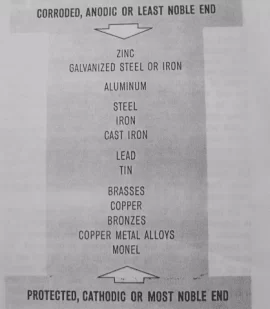Certainly the copper tubing (the cathode) can eat away the steel pipe (the anode) if the water conditions (i.e. the electrolyte), are not right. I just took apart a 40 year old wood boiler system with copper-steel connections and there wasn't any major corrosion issues. I do deal with salt water cooling systems and the galvanic issues are tremendous. I do try to use a brass fitting between copper and steel since in the heirarchy of galvanic corrsion in metals they are more closely compatible and should result in less corrosion.
I just googled for a reference. Try this:
http://en.wikipedia.org/wiki/Galvanic_corrosion
Yes salt water makes a big difference.
Some info the CopperDevelopment Association sent me years ago when I researched dissimilar metals in piping.
"Salt water and acid are excellent electrolydes, ordianry fresh water is a weak electrolyte. The weaker the electrolyte

the more limited the galvanic action. It should be emphasized that with fresh water, galvanic corrosion is not comon. Often any form of corrosion that is not clearly understood is wrongly labeled as electrolysis or galvanic action."
"Black steel is anodic with respect to copper tube, however the close proximity of the two metals in the galvanic series indicates corrosion potential is only moderate."
"The pipe dope or sealant tape further tends to increase the joints electrical resistance, further decreasing the corrosion potential."
The film that forms inside the piping in hydronic systems also offers protection from corrosion. This is one of the components in hydronic conditioner fluids, a film provider to lessen corrosion potential.
Fire protection sprinkler systems mix copper and steel connections also.
I agree a typical plumbing brass does add some additional protection, on the galvanic series it is right next to copper, so very little additional protection.
Remember regular, off the shelf dielectric unions are temperature rated to 180F, not a great fitting for boiler use, fine for water heaters, or any galvanized to copper connection.
There is always potential for corrosion even with copper to copper connections, an example in the studies shows a new piece of copper added into an older system pin holed.



